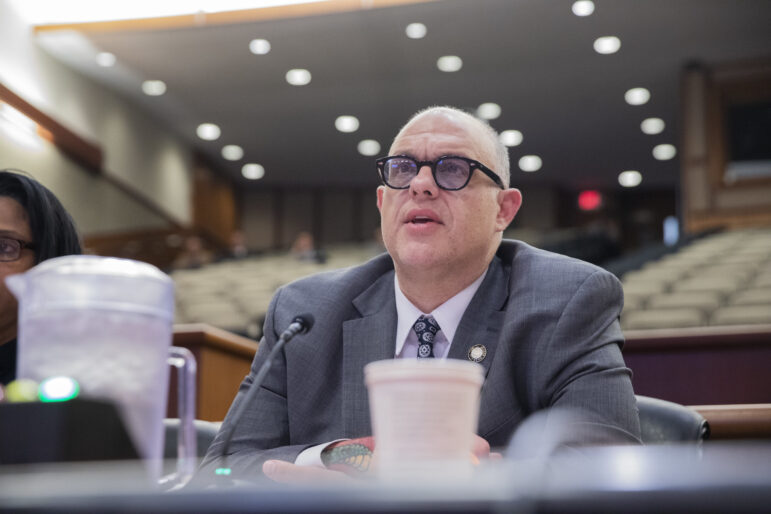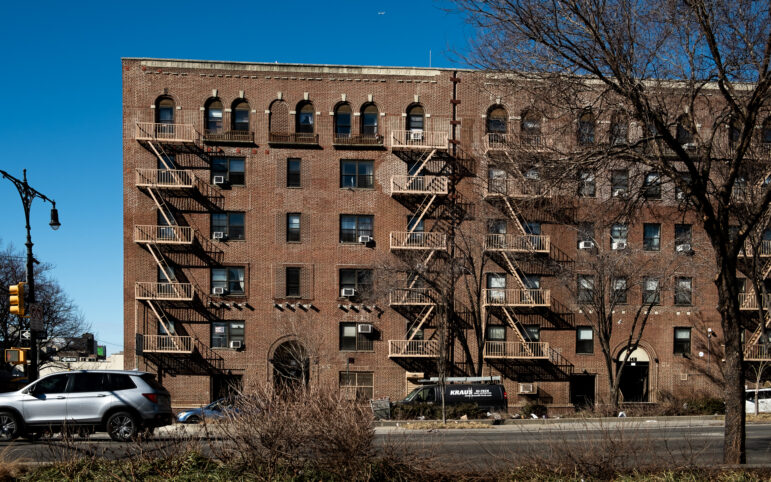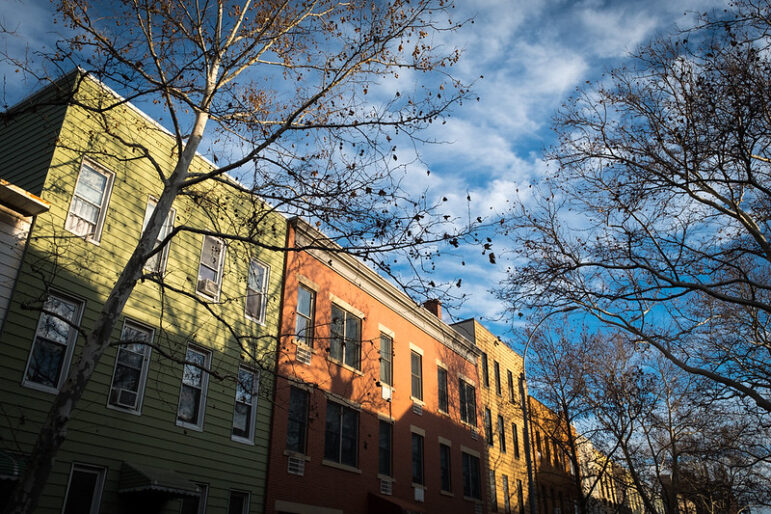
Photo by: Marc Fader
Betsy Idelfonso, who is HIV positive, in the bedroom she hopes her twins will share when she regains custody of them. She blames city policy changes for the seven months it took her to get an apartment.
Besty Idelfonso spent months sleeping on the floor of her mother’s Bronx apartment. Homeless and on a regimen of antiretroviral drugs, she needed a stable place to stay. A social worker referred her to the city’s HIV/AIDS Services Administration (HASA), which provides rental assistance to poor New Yorkers with the disease, and Idelfonso pinned her hopes on the program. Having her own apartment would mean she could be reunited with her four-year-old twins.
But then, last spring, HASA decided to start paying only 50 percent of the normal fee for apartment brokers.
“The brokers expected me to pay the other half,” says Idelfonso, whose sole source of income is the monthly $359 in cash she gets from HASA. The broker’s full fee equaled one month’s rent; her half would have come to $550. “I didn’t have the money. I kept looking for places where they would accept the half fee, but it was a big problem.” Finding an apartment under the HASA program took her seven months.
Stories like Idelfonso’s are at the center of a bitter dispute between the Bloomberg administration and AIDS housing groups over the effects of a nine-month-old policy shift that slashed fees for real-estate brokers. The groups say that now brokers are refusing to find apartments for their HASA clients, mostly homeless people whose compromised immune systems require them to avoid shelters. Landlords, they add, are also reluctant to accept a HASA voucher instead of an upfront security deposit.
HASA serves nearly 46,000 people, and more than half live in private apartments paid for in whole or in part by rent subsidies. The city says the new policy changes have had no impact on housing homeless people with symptomatic HIV or AIDS. Idelfonso and others claim the city has created a crisis. The resulting standoff has taken a surreal turn, as the two sides describe different worlds.
A broad shift in policy
The changes came as the Bloomberg administration lost legal and political battles to reduce HASA spending. Earlier this year a federal judge stopped an effort to trim the number of HASA caseworkers, and over the last two years the City Council restored $7 million in cuts to supportive housing services. Nonetheless, while the city’s caseload climbed 6.5 percent in the last three years (a rise of about 2,000 people), spending per case declined 3.3 percent in 2011, according to the Independent Budget Office.
In March, the city’s Human Resources Administration (HRA), which oversees HASA, implemented the new rule on brokers’ fees and security deposits, hoping to save an annual $4.8 million. The policy affected all of its housing programs and was not aimed specifically at HASA. “HASA has seen little change in the number of requests to approve new housing since the policy went into effect,” says a HASA spokesperson.
But nonprofit service providers insist that the city is out of touch with reality. “Many clients do housing searches on their own or with community-based case managers, not with their HASA case managers,” says Kristin Goodwin, director of policy and organizing at Housing Works. “It seems disingenuous to me for them to claim that it is a rare occurrence when we hear it daily from our case managers and our clients in housing searches.”
Differing realities
The dispute came to a head at a July 26 meeting of AIDS service providers, when Shubert Botein Policy Associates presented the findings of a survey conducted for Housing Works after the first two months under HASA’s new rule. Of the 238 case managers who responded, 94 percent called the change a significant barrier to finding housing, more than half said it had prevented the placement of at least one client, and 61 percent said it was taking significantly longer to find apartments than the previous year.
A “bizarre interaction” then unfolded between the survey’s author, attorney Virginia Shubert, and HASA’s new deputy commissioner Jacqueline Dudley, recalls Sean Barry, executive director of VOCAL-NY (formerly the New York City AIDS Housing Network). “The deputy commissioner said, ‘Look, we haven’t heard this is a problem from clients or providers,’ and she was saying that in a roomful of housing providers. The room erupted. She just wouldn’t hear it.”
Harriet Cohen says the effects of the policy change were immediate. “Over a period of four or five weeks, 35 brokers dropped us,” says Cohen, housing director for the AIDS Center of Queens County. “Many of the brokers that we were dealing with just don’t want to deal with us anymore. It’s a terrible problem. I haven’t done the count since, but I hear all the time from my people who say, ‘I made five calls, and no one wants to work with me.'”
The policy’s fallout convinced the group Harlem Works, one of the city’s largest service providers, to raid its own funds. Since March, the number of apartment brokers willing to deal with its HASA clients plummeted from 85 to 5. In desperation, the group began to pay full fees to brokers. As of last week, Harlem Works had spent $27,623 for brokers’ fees to secure 41 apartments.
In an August follow-up meeting with HASA officials, service providers asked for the contact information of brokers who were still working with the agency. “We got a list of four brokers,” says Goodwin. “The list wasn’t even given to us in writing, but was dictated to someone.” Housing Works distributed the phone numbers. “Everyone who tried to contact these brokers has not been successful in even getting a hold of them. One broker’s office had an outdated phone number,” Goodwin says. “We asked again, and the HASA advisory board also asked, and so far we have not seen a real list of brokers.”
In response to a City Limits inquiry, HASA said “about three dozen” brokers are currently working with its clients, but “due to legal consideration” it would not provide the list. “If they have a list,” Goodwin asks, “why are they not sharing with the community?”
Part of the trouble is that many brokers are unlicensed, explains Cohen, and therefore do business through the offices of permitted agents. “You’re already splitting your fee with that licensed broker, so let’s say you find a new HASA apartment: You’ll get 50 percent of the 50 percent. Who wants to do that? How hard do you want to work? Will you work with us at all?” There’s also the bureaucracy and delay involved in getting paid from the city. “We lose apartments all the time to people who can pay upfront,” Cohen says.
Stive Joseph, the coordinator of housing placement assistance at Bronx Works, says that since March the group’s list of brokers has dwindled from about 80 to eight. “The landlords and brokers willing to work with HASA recipients were already scarce. They have to overlook bad credit scores and other factors like criminal histories. The brokers are instrumental because they’re the middlemen,” he says. “But when the new policy was implemented, a lot of brokers no longer wanted to work as our advocates. Some who would work with us ended up asking for the clients to pay the other half of their fee.” HASA’s prohibition against this practice hasn’t stopped brokers from saying, “Give me $200 now, the rest later. It’s just between you and me,” Joseph claims.
Willing brokers hard to find
How much should brokers make for their services? The city says the HASA housing program still presents “a significant opportunity for them to earn fees.”
HASA acknowledges “a few instances in which brokers who are unclear about this policy have attempted to collect the full fee from clients,” but the agency’s rule is clear: Clients can’t pay brokers. “Whenever that has occurred, HASA staff has stepped in immediately to remedy the situation,” says a spokesperson. “Presently, these problems are a rare occurrence.”
The real problem, say the housing groups, is that the best brokers don’t need HASA’s business.
“HASA made a gamble that they had enough market influence to make this policy change and most brokers would go along with it,” says Barry. “But they neglected the fact that HASA clients already face a high level of discrimination among brokers and landlords. It’s illegal, but it doesn’t mean that it isn’t a daily occurrence.”
A big reason for the bias among landlords and brokers, Barry explains, is that many HASA tenants fall into arrears because rent contributions take up most of their disability checks. He thinks HASA should cap the client’s contribution to 30 percent of income.
When contacted by City Limits, one broker was blunt, painting the “typical” HASA client as a “pain,” unwilling or unable to even pay for the credit check required by landlords. Though the broker had worked with the HASA program in the past—and requested anonymity because he wouldn’t rule out working with HASA in the future—the fee was a “last straw. . . . I don’t have the time to volunteer.”
Joseph tried to eliminate the broker problem by approaching landlords directly. “But the landlords wanted the full month’s security,” he says. “The new voucher is just a promise.”
The voucher system always existed, responds an HRA spokesperson, but most landlords took advantage of an exception to the rule that allowed for cash deposits. “Payment of cash rental deposits kept social service dollars needlessly unavailable to the city. Now the legal relationship is between the landlord who owns an apartment and the client/recipient who is leasing it. Also, under the current procedure, landlords continue to have a guarantee that they will be covered for demonstrated lost rent or damages.” HRA calls the voucher a “sensible, cost-effective approach that takes into account the needs of tenants and landlords.”
Cohen says the voucher mandate has set a higher hurdle for her group in Queens, where small landlords with two-family homes don’t want to deal with getting estimates for repairs and filling out paperwork in order to get paid. “They just don’t want to play ball with us at all,” she says. “The security deposit was an incentive to take our clients. Now the city’s not giving that money upfront; they’re giving it at the back end, and they’re holding their breath, hoping that people won’t bother redeeming it.”
Seeking stability
William White spent nearly five months in an SRO while he looked for an apartment. His partner of 11 years died in June, and he had to vacate their home because only her name was on the lease. Both HIV-positive, they had met in emergency housing. “I called her my wife,” he says.
He wanted out the SRO—”if you’re trying to get your life together, that’s not the place you want to be”—but brokers kept asking for him to pay the other half of their fee. He refused, though two of his friends paid half fees to get their apartments.
“A lot of realtors know our situation—HIV positive, in SROs, and wanting to find a place to stay—so that means if we really want a place to stay, we have to play their game,” he says. “I was just one who wouldn’t play the game because I knew the rules.”
He finally found an apartment in Tremont for $1,100 a month. A Navy veteran, he collects $985 a month in disability, and HASA pays a portion of his rent. “I pay $625,” he says. “After I pay Con Ed, my phone bill, and cable, I have like maybe $100 left to live off of.” He says apartment brokers and landlords in his neighborhood prefer Section 8 to HASA; under Section 8, the broker collects his full fee. “Everything’s about money.”
Still, White’s grateful to have a stable apartment. “I do what I have to do to live,” he says. “I don’t look at it as a disease: I look at it as a second chance.”








